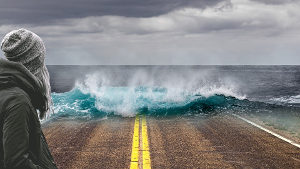Global warming is the long-term rise in the average temperature of the Earth’s climate system. It is a major aspect of current climate change, and has been demonstrated by direct temperature measurement and by measurements of various effects of the warming.The term commonly refers to the mainly human-caused increase in global surface temperature and its projected continuation.Human influence has been the dominant cause of the observed warming since the mid-20th century. The largest human influence has been the discharge of greenhouse gases such as carbon dioxide, methane, and nitrous oxide.
But why should everyone be skeptic of Global warming and what is it doing to the earth?

Image courtesy of Pixabay
The reasons of being skeptic are the effects of global warming include rising sea levels, regional changes in precipitation, more persistent extreme weather events such as heat waves, and expansion of deserts. Surface temperature increases are greatest in the Arctic, which has contributed to the retreat of glaciers, permafrost, and sea ice. Overall, higher temperatures bring more rain and snowfall, but for some regions droughts and wildfires increase instead. Climate change threatens to abate crop yields, harming food security, and rising sea levels may flood coastal framework and force the abandonment of many coastal cities. Environmental impacts include the elimination or relocation of many species as their ecosystems change, most immediately the environments of coral reefs, mountains, and the Arctic. Due to the persistence of CO2 in the atmosphere and the inertia of the climate system, climatic changes and their effects will continue for millennia even if carbon emissions are stopped.
Change Will Continue Through This Century and Beyond:
Global climate is projected to continue to change over this century and beyond. The magnitude of climate change beyond the next few decades depends primarily on the amount of heat-trapping gases emitted globally, and how sensitive the Earth’s climate is to those emissions.Temperatures will continue to rise because human-induced warming is superimposed on a naturally varying climate, the temperature rise has not been, and will not be, uniform across the world. More droughts and heat waves (periods of abnormally hot weather lasting days to weeks) are projected to become more intense, and cold waves less intense everywhere in the world.The intensity, frequency and duration of North Atlantic hurricanes, as well as the frequency of the strongest hurricanes, have all increased since the early 80s. The relative contributions of human and natural causes to these increases are still uncertain. Hurricane-associated storm intensity and rainfall rates are projected to increase as the climate continues to warm.
Summer temperatures will continue rising, and a reduction of soil moisture, which inflame heat waves. By the end of this century, what have been once-in-20-year extreme heat days (one-day events) are to occur every two or three years over the world. Global sea level has risen by about 8 inches since reliable record keeping began in 1880. It will rise another 1 to 4 feet by 2100. This is the result of added water from melting land ice and the expansion of seawater as it warms.
In the next several decades, storm surges and high tides could combine with sea level rise and land subsidence to further increase flooding in many regions. Sea level rise will continue past 2100. Ocean waters will thus continue to warm and sea level will continue to rise for many centuries at rates equal to or higher than now and the Arctic Ocean is expected to become substantially ice free in summer before mid-century.
Allergies, asthma, and infectious disease outbreaks will become more common due to increased growth of pollen-producing ragweed, higher levels of air pollution, and the spread of conditions favorable to pathogens and mosquitoes. Forests, farms, and cities will face troublesome new pests, heat waves, heavy downpours, and increased flooding. All those factors will damage or destroy agriculture and fisheries.
